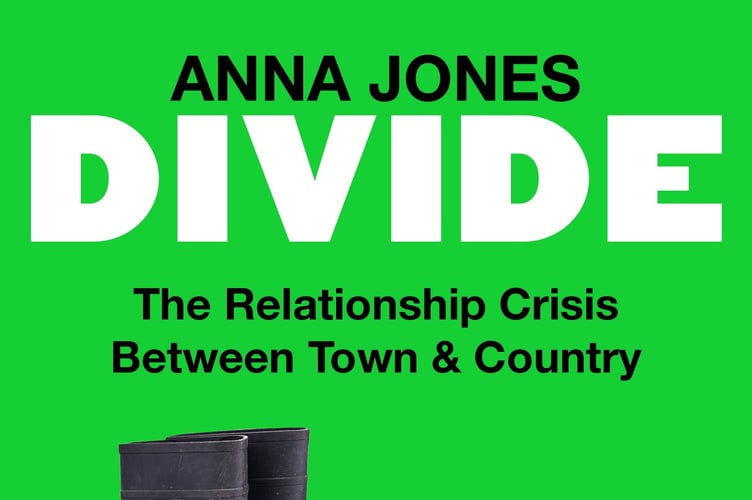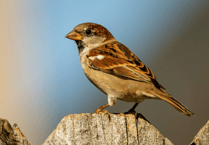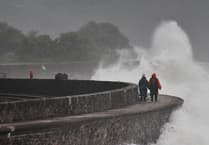Purely by chance, the day of the interview with author Ana Jones happens to coincide with the news that beleaguered BBC presenter Chris Packham has decided to employ a bodyguard on his programme Winterwatch after receiving threats.
Not many more details have emerged at the time of going to print, but the latest incident highlights once again the often fraught relationship between conservationists and rural communities. And Jones, who’s also a BBC producer and former presenter of BBC One’s Countryfile, knows better than most how that division can spill over into open war.
Her latest book, Divide: The relationship crisis between Town and Country, has been described as a call to action, with Jones warning that unless we learn to accept and respect social, cultural and political differences between the two “we are never going to solve the chronic problems in our food system and environment”.
Unfortunately, the signs are that the divide is becoming increasingly fractious (Packham’s latest drama notwithstanding) – and social media is not helping.
“In recent years, people have felt social and political pressure to subscribe to a camp or a view. It’s made it very difficult for the nuances and the grey areas in the middle to cut through because they can’t be summed up in a neat social media post,” she says.
Jones wanted to cover the divisions between the rural world and cities as fully as she could in her book, including the politics, as well as our relationship with animals and the environment, right down to the food we eat and how it arrives on our plate.
Like it or not, Brexit also worked its way insidiously into the mix, as it marked a before-and-after moment in Britain’s relationship with farming. Jones was in the thick of it long before that particular debate got going, and remembers the days when farming scarcely got a mention in the news.
“It was sort of a niche topic, and I was seen very much as a niche journalist working in rural affairs. With Brexit, it catapulted up the news agenda because farming was completely funded by the EU under the Common Agricultural Policy. Bringing it back into domestic policy made it much more domestically and politically relevant again.”
Having been brought up on the Welsh borders, Jones can in no way be considered a townie, and she recalls how everyone in her extensive family was a Brexiteer.
“There were very few vocal Remainers, and if there were they were quite uncomfortable about speaking out. But when I went down the M5 to Bristol, where I was living at the time, every one was a Remainer, and if you were a secret Brexiteer you probably wouldn’t speak out about it.
“Seeing feelings on both sides and understanding them gave me something that not a lot of people had, which was a fully-rounded view of everybody’s take on this huge, divisive debate that really did break our country. It tore a cut right down the middle - it was like a civil war of minds and identities.”
It could be argued that Brexit was simply a reflection of Britain’s class system, but she says the urban-rural divide has also been felt abroad, including the US, Australia, New Zealand and Denmark. “It’s very much a symptom of the post-industrial world.”

Yet the English countryside is a particularly emotive subject for people. Why is that?
“It’s because of this value that we place on the countryside as a place of peace, escape and spiritual renewal. This whole aspirational idea of escaping to the country is a very English one.”
It has also given rise to unrealistic expectations, in her view. “We’ve become obsessed with what we think the countryside should look like and the life we should have there...because it’s a working landscape with working people, and sometimes it smells really bad and there are really ugly things about it.”
With soaring house prices and a feeling among rural communities that they are being unfairly targeted, the ingredients are there for further strife, but Jones is convinced people must be willing to view each other’s world from the other side of the proverbial fence.
It won’t be easy. No single issue appears to divide opinion more about the rural world than fox-hunting, despite it being illegal since 2004. Yet, Jones believes the issue has been blown out of proportion and covers it lightly in her book.
“Even though I’m a rural girl, hunting wasn’t in my world growing up. You can grow up in a farming community like I did and never meet up a hunter or a shooter. The idea that the countryside is all about country sports is probably a bit of a misnomer, but it is part of rural life.
“I admit I don’t understand it, and in a way it’s good to look in on something with no personal understanding.”
Seeing both sides of an argument is part and parcel of being a journalist, but surely it’s only natural to expect to have one’s own opinions on certain issues – especially given her level of expertise, I suggest.
She disagrees, dismissing a desire to air a strongly held opinion on a particular topic as “a soap-box moment”, whether it’s about badger culling, pesticide use, land access, right-to-roam or being a vegan.
“I don’t reveal my own opinions in my book. The book shelves are bulging with people’s personal opinions about issues - and what’s one more voice going to do?”
It may not be a fashionable stance, particularly in an age defined by intellectually lightweight influencers, but she is adamant that it’s a hill worth dying on, metaphorically speaking.
“People do challenge me on it. Someone recently said to me ‘if you don’t stand for something, you stand for nothing’, and I just disagree because the world is full of campaigners and activists. We need those people, but the world also needs diplomats; it needs people who can understand and listen.”
I ask if farming can thrive in the UK, given soaring costs, dwindling financial aid and the demands being placed upon them to be ever-more environmentally conscious – issues that evidently transcend Brexit, judging by the recent protests by Dutch and German farmers.
“Many are saying they can’t because pressures are coming at them from all directions. We’re going to see massive changes and we’re going to see more farms lost because in order to make a profit or even break even they are completely reliant on the Basic Payment Scheme (a government scheme that provides financial support to farmers).
“My take is ‘ok, if we’re going to lose those farms what’s going to replace them?’ What I don’t want to see is further consolidation of an industry that’s been shrinking for many years, anyway. We need a mixture of big, medium and small-sized farms. That patchwork is good for rural communities.”
With an increasingly aging farming population this brave new world begins to sound more like a catastrophe in the making. Can the sector be saved?
“Sharing the land out among a larger number of land workers and farmers would be a healthier way forward because it keeps our rural communities alive. It keeps kids in the school, people in the local church, and in the local village hall and on the parish council.”
Large supermarkets, I suggest, are also seen as the enemy of farmers, but aren’t they just trying to keep costs down for the consumer?
“The feeling among all farmers is that retailers wield too much power and they’re at the bottom of the pile. But the (recent) egg shortage was as a result of the farmers saying ‘no’ to the supermarkets, and it worked – the supermarkets had to pay more for eggs.
“When you break it down to ‘who feeds us’ the power will always be with the farmer. Maybe they know it now more than they did before.”
She admits she has reassessed her opinions about boutique, locally-produced food in the wake of the cost-of-living crisis. “I’ve had to climb down from that ivory tower. I’m far less high minded about it. I can’t say supermarkets are evil because I rely on them, but at the same time it’s about making sure the balance of power doesn’t tip too dangerously towards the supermarket.”
Her talk this week at Dartington Hall will also give her an opportunity to share her own perceptions about Devon, a county that is both rural and affluent.
“Devon is like Shropshire in many ways. I don’t know Totnes – I’ve never been there – but I would imagine there’s a fairly well read crowd there.
“They’ll have strong feelings about food, farming and the environment because they are engaged with those issues.”
However, she also fears “hard to reach farmers” who live in deeply rural areas of Devon and whose views are just as important, may well miss out on the event.
“I’d love them to be there but I don’t think they will, and that’s what I think about the divide in these areas.
“My job is to be the voice that moves between these two circles and bring just a bit of tiny insight into the other.”
Divide: : The relationship crisis between Town and Country is published Kyle Books at £16.99.





Comments
This article has no comments yet. Be the first to leave a comment.